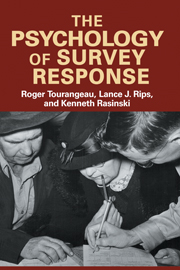Book contents
- Frontmatter
- Contents
- Preface
- 1 An Introduction and a Point of View
- 2 Respondents' Understanding of Survey Questions
- 3 The Role of Memory in Survey Responding
- 4 Answering Questions about Dates and Durations
- 5 Factual Judgments and Numerical Estimates
- 6 Attitude Questions
- 7 Attitude Judgments and Context Effects
- 8 Selecting a Response: Mapping Judgments to Survey Answers
- 9 Editing of Responses: Reporting about Sensitive Topics
- 10 Mode of Data Collection
- 11 Impact of Cognitive Models on Survey Measurement
- References
- Author Index
- Subject Index
11 - Impact of Cognitive Models on Survey Measurement
Published online by Cambridge University Press: 05 June 2012
- Frontmatter
- Contents
- Preface
- 1 An Introduction and a Point of View
- 2 Respondents' Understanding of Survey Questions
- 3 The Role of Memory in Survey Responding
- 4 Answering Questions about Dates and Durations
- 5 Factual Judgments and Numerical Estimates
- 6 Attitude Questions
- 7 Attitude Judgments and Context Effects
- 8 Selecting a Response: Mapping Judgments to Survey Answers
- 9 Editing of Responses: Reporting about Sensitive Topics
- 10 Mode of Data Collection
- 11 Impact of Cognitive Models on Survey Measurement
- References
- Author Index
- Subject Index
Summary
During the past decade, cognitive theories have swept through survey methodology as they had earlier swept through psychology in 1970s and 1980s. Although the adoption of cognitive concepts and methods may seem quite rapid, it's still uncertain how much impact these ideas will ultimately have.
The first effort to foster collaboration between cognitive scientists and survey researchers took place in the late 1970s, when the British Social Science Research Council sponsored a conference on retrospective data in surveys. The conference brought psychologists and survey researchers together, apparently for the first time, to explore measurement problems in surveys; the immediate product of the conference was a volume edited by Moss and Goldstein (1979) focusing on problems of recall. Similar efforts to spark collaborations between cognitive psychologists and survey researchers began in the United States in 1980 and reached an early watershed in 1983, when the Committee on National Statistics, with support from the National Science Foundation (NSF), sponsored a seminar on cognitive aspects of survey methodology (see Jabine, Straf, Tanur, & Tourangeau, 1984). This seminar marked the beginning of long-term institutional support for the interdisciplinary movement, in the form of NSF grants to researchers outside the government and interagency transfers from NSF to the National Center for Health Statistics (NCHS). Much of the research reviewed in this book was carried out under grants from NSF, contracts from NCHS, or both.
- Type
- Chapter
- Information
- The Psychology of Survey Response , pp. 313 - 342Publisher: Cambridge University PressPrint publication year: 2000
- 2
- Cited by



